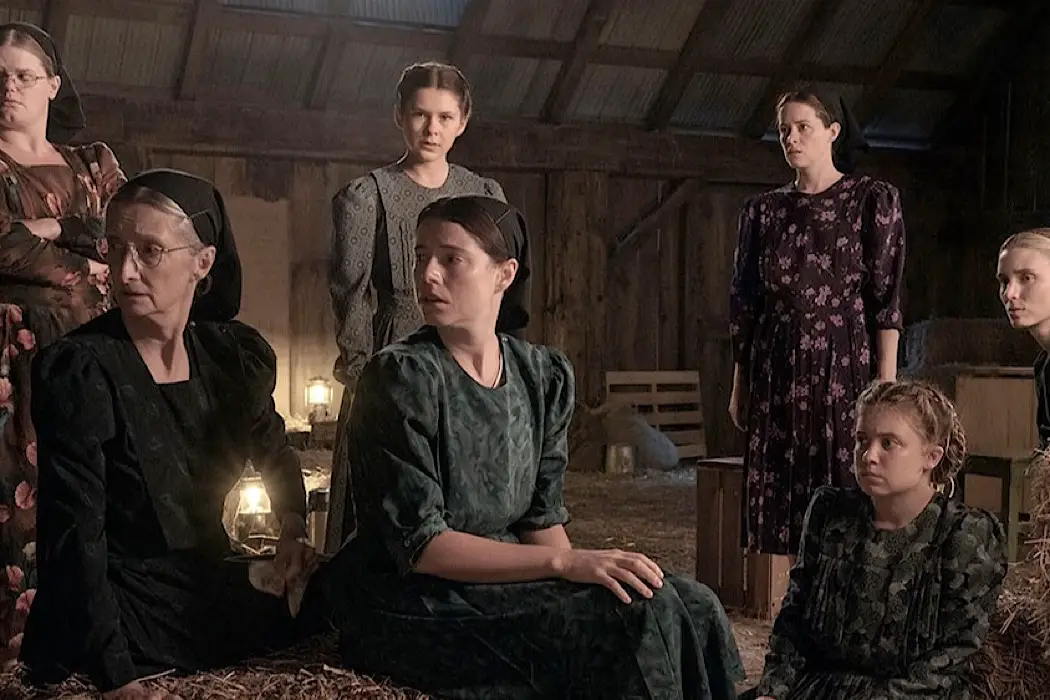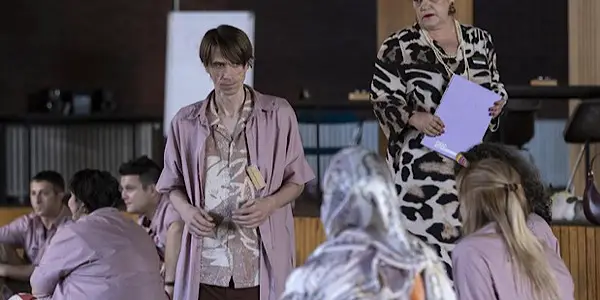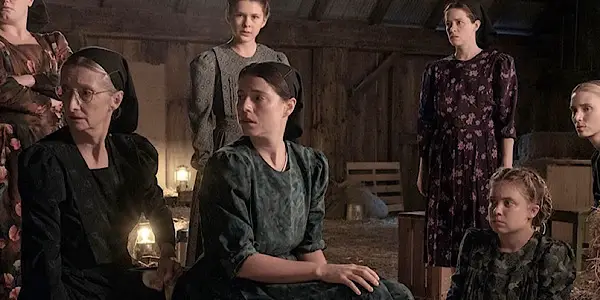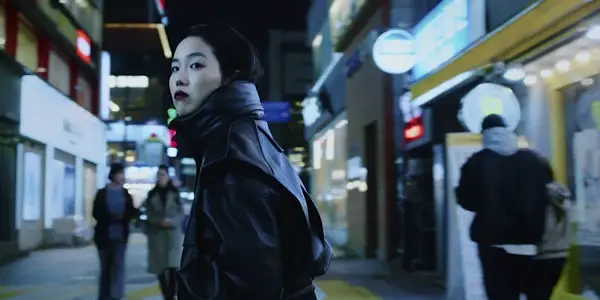Toronto International Film Festival, Report 3: THE HAPPIEST MAN IN THE WORLD, WOMEN TALKING & RETURN TO SEOUL

Kristy Strouse is the Owner/Editor in Chief of Film Inquiry,…
When I attend a festival I truly love to discover films I wouldn’t have heard of otherwise and like to mix in a smattering of genres and experiences. This year’s TIFF is very much a complex mix of entries, and luckily I can say, I saw a lot of bangers. With this report, there are some of the best female performances of the fest.

The Happiest Man in the World (Teona Strugar Mitevska)
As you might be able to decipher from this exclamation of a title, this film is certainly not about someone who is The Happiest Man in the World, and while this is clear early on, the reverberations of the catalyst of the story are thundering until its end.
It starts with Asja (Jelena Kordic Kuret) attending a blind dating event in Sarajevo. Everyone is paired and put into matching jackets with their name tags. From there they are given prompt questions and other games/activities to get to know their partners. Asja is here for romance, but Zoran (Adnan Omerovic)… something else. Zoran seems nervous, and while they are both shy in their ways, but he seems to be keeping something in, something that in due time will come up and eventually consumes the day’s processions. In a situation that can already be nerve-wracking, it’s about to get much more so.
This film touches on the time between 1993 and 1996 when Sarajevo was attacked by Serbian forces, and The Happiest Man in the World shows those wounds and the trauma it has caused years later. Zoran mentions to Asja a very specific date, one where she was shot, with a specificity to detail later determined because it was by his hand. Is he looking for forgiveness? Why like this? Though the film doesn’t entirely give way to everyone’s thoughts, a lot of emotions: anger, sadness, and confusion make their way over our leads and the supporting cast who become unexpected pieces in this.
The camerawork by Virginie Saint Martin brings additional anxiety with its tight close-ups, and jarring shifts. It’s increased by the two terrific and vulnerable performances, often stopped in the middle of a revelation or argument by the sequence of a lighthearted game or some funny banter. The moments of levity that dip in and out only make the ones that are truly powerful that much more so. Some of the third act had some narrative details that I wasn’t sure entirely work, but as a whole, it paints a stark picture. Jelena Kordic Kuret, in particular, gives a stand-out and heartbreaking performance.
At times, not an easy watch, The Happiest Man in the World is an intelligently written, conceit that is both bold and different, that shows what the traumas of war can do.

Women Talking (Sarah Polley)
This was an intense watch and as the credits rolled the audience nearly did a collective exhale. The majority of the film takes place within a barn as a group of women in a community talking through a tough decision. After its discovered that the men in the colony have been raping the women, a group of prominent families discusses if they should leave, fight, or forgive.
Suffice it to say, this is a stacked cast: Frances McDormand, Rooney Mara, Jessie Buckley, Claire Foy, Michelle McLeod, Sheila McCarthy, Judith Ivey, and others! There’s also Ben Whishaw who is there to take notes of the meeting as the women are not able to.
This is another stellar film by Polley, who is here to remind us that she is one of the most talented female directors out there. Women Talking is full of amazing performances, but Rooney Mara‘s Ona and Claire Foy‘s Salome stuck with me the most, and each truly embodies their characters with differing kinds of ferocity.
One of the things that lacked somewhat for me was the visuals, but after hearing Sarah Polley discussing them some in her Q&A I do understand the logic. It’s very muted, and at times some of the camerawork feels like it could have been more pointed.
Regardless of that, the fantastically written screenplay (written by Sarah Polley and Miriam Toews) is brought to life by an ensemble of amazing talent. For such an enclosed setting with a mostly dialogue-based script, Women Talking never slows, it’s always tense and thought-provoking. No part of the conversation feels less important than another, and each character feels real and defining.
This was was a powerful one. As a big fan of Sarah Polley, I was overall moved and impressed by the performances of the epic ensemble cast and its expertly written script. There were some technical elements I feel could have been improved, but overall one that will undoubtedly grab the Academy’s attention. It boasts one of the most talented groups of actresses assembled on screen, and with a stellar writer/director behind them, these women aren’t just talking, we are listening.

Return to Seoul (Davy Chou)
Soulful, full of messy energy and unpredictability, Return to Seoul is a voyage of one woman’s arrival in Seoul to figure out her identity. This was a pleasant surprise of the fest that really resonated with me.
Freddie (Park Ji-Min) was raised in France but has returned to where she was adopted. While we don’t know much it is clear that this is the first time she’s been back.
Return to Seoul is not without its infuriating moments, but such connects the film’s trajectory with that of our main character. The two are tied together irrefutably so that each scene feels like an extension of the restlessness of our lead. As the story unfolds a lot remains unknown about the why or what of Freddie’s motives. It’s a daring film, that spans eight years making some interesting and sometimes outlandish jumps, all of which feel like gears shifting as we see where Freddie ends up next. Writer/director Davy Chou takes us on a frenetic but riveting journey with Freddie, as she seeks out her past. Ji-Min is clearly suffering internally, but maneuvers through the film with equal parts charisma and bravado, making this one of the most memorable films of the fest.
I had the pleasure of meeting director Davy Chou and star Park Ji-Min, and both were incredibly humbled by the reaction the film had, especially newcomer Park Ji-Min who proclaimed she wasn’t an actress. Well, even if the visual artist never returns in front of the camera, Return to Seoul ensures she’s got star power. It’s one of, if not, my favorite female performances of the year.
Return to Seoul is quite the journey; emotional and restless, perfectly matched to our unpredictable lead that is wonderfully captured by newcomer Park Ji-Min. Don’t sleep on this one.
Does content like this matter to you?
Become a Member and support film journalism. Unlock access to all of Film Inquiry`s great articles. Join a community of like-minded readers who are passionate about cinema - get access to our private members Network, give back to independent filmmakers, and more.
Kristy Strouse is the Owner/Editor in Chief of Film Inquiry, writer, podcaster, and all around film and TV fanatic. She's also VP of Genomic Operations at Katch Data and is a member of The Online Association of Female Film Critics and The Hollywood Creative Alliance. She also has a horror website: Wonderfully Weird & Horrifying.













